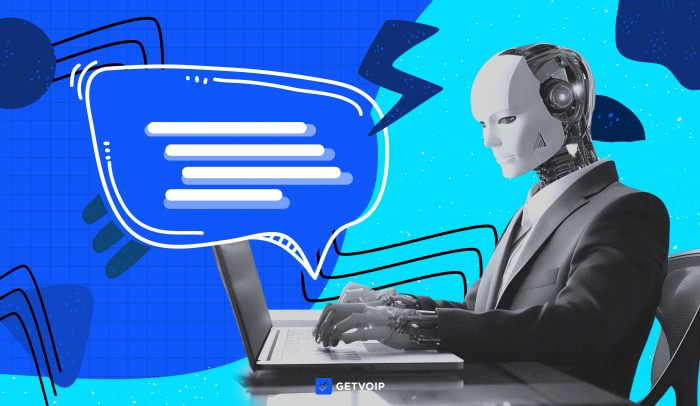In recent years, call center software has heavily integrated artificial intelligence (AI) to automate time-consuming business processes, improve customer experience, and streamline communication across all channels and touchpoints.
AI-based call centers use Natural Language Understanding (NLP) and machine learning to enable 24/7 customer self-service, improve the sales process, and decrease average handle time (AHT.) AI forecasting optimizes the agent scheduling process, while speech and text analytics provide insight into employee performance and customer sentiment.
What other benefits does an AI call center offer, and which features should you look for? What are the top call center platforms powered by AI technology? Keep reading to find out.
- Impact of AI
- How AI is Used
- Advantages
- Key Features
- Best Practices
- Providers
- Future of AI Call Centers
The Impact of AI in Call Centers
The surge of AI, machine learning, and conversational intelligence has radically transformed contact centers. Today’s contact center software solutions utilize AI in multiple forms: predictive omnichannel routing, in-call agent assist, outbound dialers, forecasting, and interaction analytics.
Modern chatbots, virtual agents, and voice bots use conversational AI to mimic realistic interactions across voice and digital channels (VoIP calling, web chat, SMS, email, social media messaging, etc.) These conversational technologies understand many customer inputs and respond naturally, guiding callers through processes like appointment scheduling, bill payment, routing, and basic customer support.
AI generates real-time transcripts for call center interactions. These transcripts power live agent feedback and interaction analytics including customer sentiment analysis, CSAT scores, and utterance monitoring. AI-based call centers lead to a major productivity boost across touchpoints for both agents and supervisors.
How is AI Used in Call Centers?
AI-based call centers integrate machine learning across multiple touchpoints and services. Here are the main ways that today’s call centers use AI:
- Routing
- Customer support
- Sales support
- Supervisor support
- Live-agent feedback
- Coaching and evaluations
- Workforce management
Routing
Call center software uses machine learning to identify the caller’s needs and route them to the best available agent. AI-based call center software uses CRM-extracted information, like the customer’s recent purchases and interaction history, to determine which agent has the training to assist them.
Predictive routing with machine learning ranks agents by customizable KPIs like average handle time, performance score, or task resolution rate. ACD then routes calls to the highest-ranking agent.
Customer Support and Self-Service
Contact centers use AI to power customer self-service through multiple mediums and touchpoints: chatbots, intelligent virtual agents (IVAs), and voicebots, and knowledge bases. AI enables these technologies to automate conversational interactions, determine customer intent and sentiment, answer questions, and provide rich services.
Chatbots and IVA systems use AI-based natural language understanding (NLU) to determine customer intent. Over time, chatbots can change their messaging patterns based on how customers speak, using generative AI to develop a more conversational style. AI bots can answer follow-up questions, link knowledge-base articles, and schedule sales or service appointments.
Sales Support and Lead Qualification
Contact center platforms use AI for multiple sales purposes: determining a potential customer’s likelihood of making a purchase, qualifying leads and updating lead status, analyzing conversation transcripts to determine customer sentiment, and more. These machines detect behaviors that indicate positive or negative lead status, providing valuable insights for sales teams.
Outbound dialers, like predictive dialers, determine when to place the next call by balancing each agent’s call duration with the likelihood of a call recipient answering the phone.
Supervisor Support
AI assists supervisors with call monitoring and call center staffing. Contact centers transcribe and analyze customer interactions in real time, identifying keywords, conversation topics, and customer sentiment scores. If a call triggers a concerning sentiment level or topic, the software notifies supervisors, who can join the interaction to support the agent.
Live-Agent Feedback
CCaaS platforms give agents automated feedback and guidance during live interactions with customers. This technology provides a live transcript, language translation, customer-sentiment monitoring, and suggested agent responses.
AI can populate the agent’s workspace with relevant customer information like recent orders or relevant knowledge base articles triggered by keywords from the interaction. Canned response suggestions can help agents make sales, answer questions, and de-escalate negative customer sentiment.
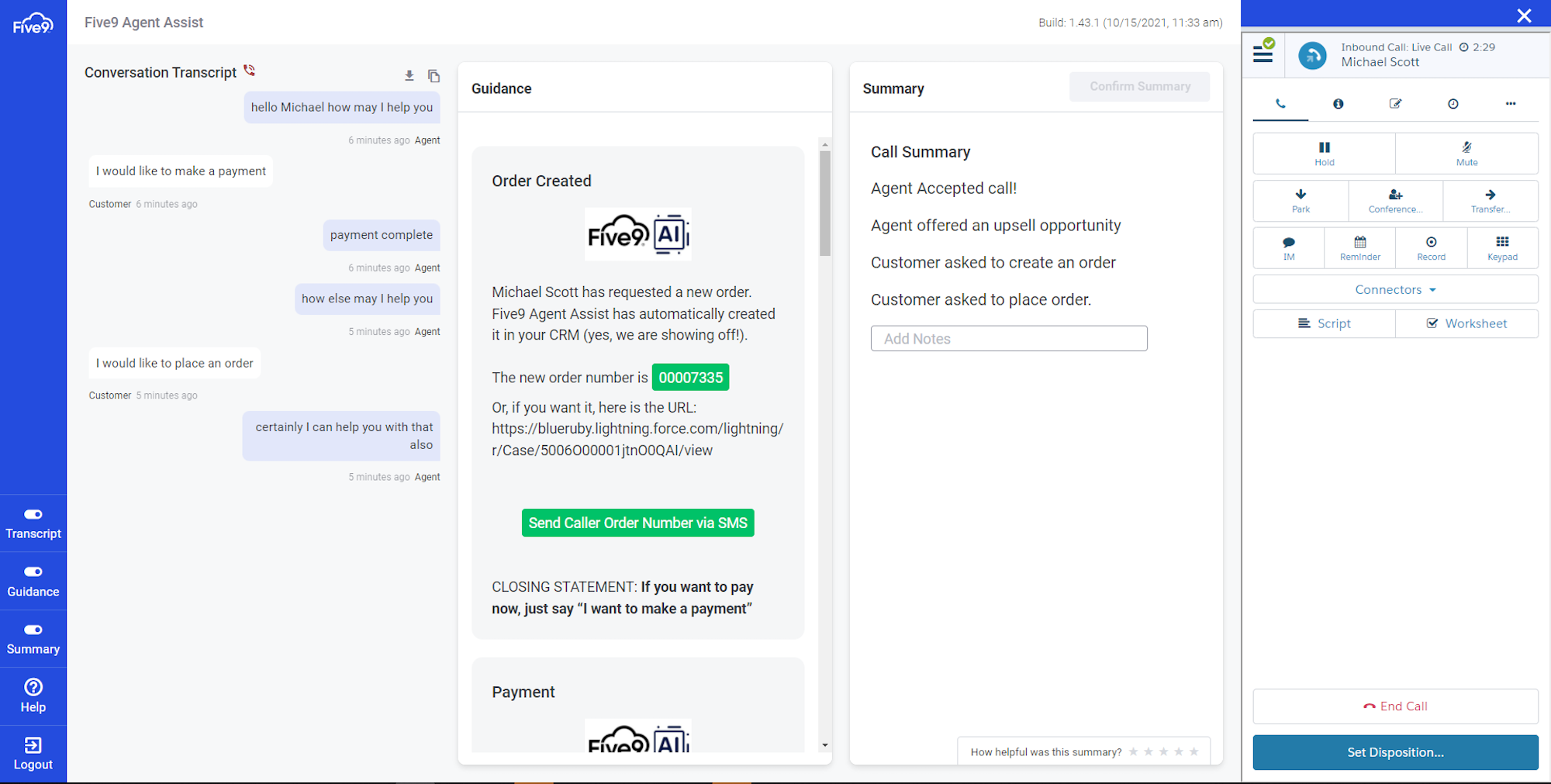
Coaching and Evaluations
Machine-learning algorithms analyze agent performance, identify behavior patterns, and pinpoint specific areas for improvement. AI evaluates agents based on KPIs like sentiment scores, handle time, task resolution rate, and more. The software uses this information to complete agent scorecards and feedback forms, automating the performance review process and automatically assigning relevant training modules to agents.
Workforce Management
AI helps contact center managers with agent scheduling, employee engagement, quality management, and other workforce optimization functionalities. AI combines historical trend analysis with predictive analytics to improve long-term workforce planning and short-term agent scheduling. Automated shift bidding/swapping, intraday management, forecasting, and adherence monitoring ensure SLA compliance and give agents control over their schedules.
What Are the Advantages of an AI-Based Call Center?
As companies compete to provide optimal customer service, AI can provide your call center with several advantages:
- Improved customer service
- Efficient staff
- Better agent training
- Shorter wait times
- Lower costs
- Better understanding of your customers
- More effective sales efforts
Improved Customer Service
AI processes boost customer convenience through 24/7 self-service. Customers can contact support teams on their preferred channel at any time. AI chatbots provide interactive responses, rich services, and accurate routing–all based on the customer’s background.
Live agents have a better understanding of customer sentiment and support needs thanks to AI analysis, and AI-based coaching helps human agents develop better customer support practices.
Efficient Staff
Artificial intelligence improves contact center agent and supervisor efficiency via automations and real-time support. AI forecasting and scheduling help managers structure shifts for staff, and automated evaluation forms help supervisors give quick feedback to more agents.
Automated call summaries and action items expedite agent post-call work. AI-powered call routing tools like predictive routing and IVA systems navigate calls to the right agent on the first attempt, leading to quicker query resolution.
Better Agent Training
Multiple AI tools work together to help agents learn quickly. Speech coaching, AI-generated checklists, and response suggestions coach agents during live interactions. Automated CSAT and customer experience scores help agents learn how their choices impact customers. AI-generated transcriptions and feedback forms offer training.
These tools benefit scaling teams that frequently add new staff or teams with a high turnover rate.
Shorter Wait Times
Efficient self-service capabilities handle customer needs without overburdening agents. Customers can find answers to questions, receive recommended knowledge base articles, handle billing issues, and more. Predictive routing ensures that customers reach agents best suited to help, considering availability and KPIs like average handle time. Together, these tools reduce queue wait times and staffing needs.
Lower Costs
AI provides customer self-service, and machine learning tools make agents and supervisors more efficient. These capabilities dramatically reduce call center staffing needs, lowering costs without sacrificing service.
Better Understanding of Your Customers
AI-based tools like interaction analytics, customer satisfaction, sentiment scores, and keyword detection strengthen your understanding of the customer experience.
AI-based analytics, like data about your customers’ frequent interactive voice response (IVR) choices and reasons for calling, help you understand what your customers want and how to serve them better. These tools inform smarter business decisions about your products, queues, and customer support.
More Effective Sales Efforts
AI-based sales tools like predictive auto dialers and lead qualification support stronger and more efficient sales campaigns. Predictive dialers automatically dial calls while agents complete their current ones, optimizing a sales agent’s on-call time.
AI lead qualification software analyzes transcripts and customer behavior patterns to segment leads, ensuring that sales teams pursue the optimal candidates.
AI Call Center Key Features
An AI call center typically combines several automated features, across channels. Here are the key features to look for in an AI call center:
- Live agent assistance
- AI call summaries
- Customer sentiment detection
- Real-time call transcription
- Chatbots, voicebots, and virtual agents
- Schedule forecasting
- Agent coaching
- Predictive routing
- Interaction analytics
Live Agent Assistance
AI provides agents real-time guidance during interactions across all channels, helping call center reps provide better support. Machine learning determines the call’s purpose and monitors the transcript to create checklists, displaying them on the agent’s dashboard to ensure that reps remember everything they need to cover.
Conversational AI technologies listen to calls, analyzing customer intent and tracking keywords. This triggers pop-ups and agent reminders, including relevant promotions, HIPAA-compliance checklists, and suggested next steps. AI displays relevant customer data like recent interactions, customer location, survey responses–even the weather in the caller’s location. Some software offers canned responses that directly coach agents through interactions without involving a live supervisor.
AI Call Summaries
Artificial intelligence uses call transcripts and large language models (LLMs) to generate a summary after each call. These summaries include post-call insights like key action items and discussion highlights, reducing agents’ post-call work time.
Administrators can review these summaries quickly, saving time that they’d otherwise spend examining each day’s transcripts and call recordings.
Customer Sentiment Detection
Call center software utilizes AI and natural language processing (NLP) to determine customer emotions, satisfaction levels, and overall experience. NLP algorithms are generally trained on large models of sample conversations and continuously learn from each customer interaction, refining the ability to determine how the customer feels. Sentiment detection works for all CCaaS channels–voice, web chat, SMS, and social media.
These sentiment scores can help companies understand how agents perform, how customers feel about particular products or issues, and how customers generally feel when interacting with the company.
Real-Time Call Transcription
Machine learning algorithms and language detection software power live call and video transcriptions. Call center software can translate transcriptions into different languages, helping agents converse across language barriers. Transcriptions support customer sentiment scores, give summaries and real-time insights for agents, and enable supervisors to monitor all active conversations.
Chatbots, Voicebots, and Virtual Assistants
While traditional chatbots have been around for a while, AI-based chatbots provide more realistic, dynamic interactions that respond to more customer inputs. Intelligent virtual agents (IVAs) and voicebots are similar to chatbots–automated technologies that engage with customers to provide self-service features like routing, question response, bill pay, and appointment booking.
AI chatbots and voicebots incorporate machine learning and language learning models to understand a wide variety of inputs and respond with more human-like text or voice. This intelligence enables AI bots to switch conversations instantly. These tools can operate across all channels and pull information from a variety of sources: CRM systems, databases, and customer journey histories.
Schedule Forecasting
AI identifies call center activity trends to predict staffing needs by season, month, and day of the week. Based on these predictions, AI-based contact center software generates suggested staff work schedules. Agents can submit their shift preferences, FTE, and availability–the software algorithm factors this in when determining schedules.
AI-based scheduling saves effort for managers and gives agents more control over their work hours.
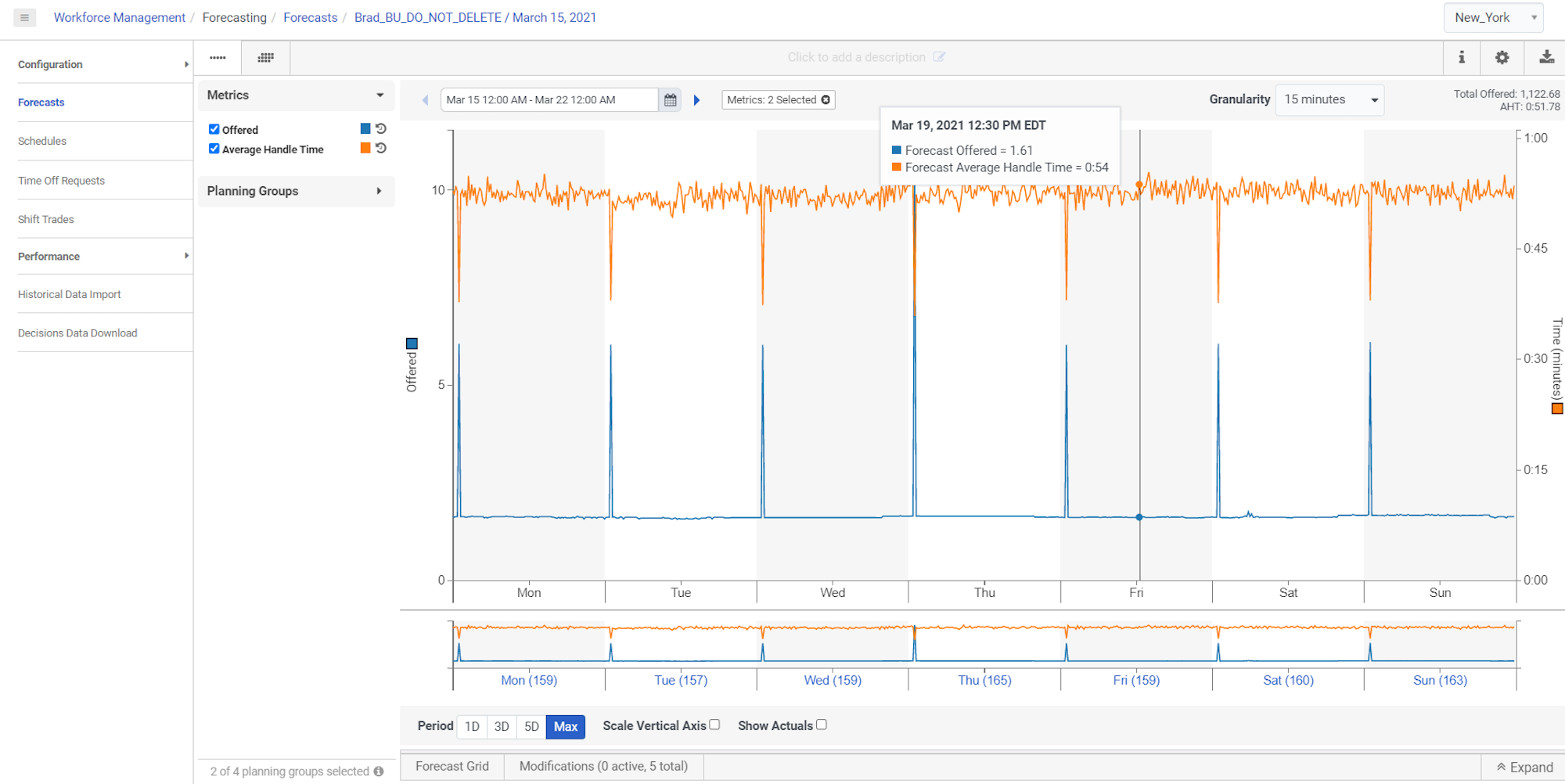
Agent Coaching and Performance Evaluation
Contact centers feature several AI-powered tools that enhance a supervisor’s ability to coach, offer feedback, and evaluate agent performance. Create custom AI scorecards for each interaction, combining metrics like response scores, keyword usage, an agent’s greeting style and tone, and more. AI tracks these metrics alongside the call summary to automatically score agents during an interaction, providing automated feedback afterward.
The same principles apply to performance evaluations. Create evaluation forms that combine metrics and KPIs to evaluate agents. AI will comb interactions, transcripts, sentiment scores, and agent behaviors to complete the evaluation form and offer feedback to agents. These AI tools help agents improve and save time for managers.
Predictive Routing
Predictive routing scores each agent in a queue by a custom KPI, selecting the best-suited agent for each inbound caller that reaches the queue. Administrators select a KPI that they want to optimize within a queue–such as sentiment score, resolution rate, or resolution speed. AI then evaluates agents according to this KPI. When a customer reaches that particular queue, predictive routing sends the customer to the highest-scoring available agent.
Predictive routing helps call centers to match inbound callers with the agent best suited to help.
Interaction Analytics
Contact center AI analyzes all customer-agent interactions across channels, tracking interaction trends and metrics. Supervisors can access these interaction analytics in out-of-the-box dashboards, customizing them by agent, department, or viewing metrics for the whole contact center.
Contact analysis AI tracks keywords, IVR selection, and chatbot conversations to determine the most frequent reasons for customer contact. Conversation insights track metrics like customer experience score, customer sentiment, and overall satisfaction. AI also scours IVR and routing systems to find opportunities for automation.
Best Practices for Implementing AI in a Call Center
When setting up an AI-based call center for your company, note the following guidelines:
- Define goals
- Dont take on too much at once
- Utilize customer feedback
- Monitor effectiveness with analytics
- Train agents
- Utilize free trials
Define Goals
Before selecting a call center plan with AI features, define your business goals for AI. Which metrics and KPIs do you want to improve? Selecting measurable, concrete KPIs makes it easier to track your AI strategies' effectiveness.
Don’t Take on Too Much at Once
Most higher-tier CCaaS plans bundle several AI features across domains: scheduling, agent assistance, supervisor support, analytics, chatbots and IVA, and more. While these features are designed to work together, it’s generally better to implement just a few at a time. Adopting too many new technologies simultaneously can overwhelm users and skew the results of your metrics and goals.
Focusing on a few AI capabilities at a time gives a better idea of each technology's impact. When users feel comfortable with one, branch out and add in more.
Utilize Customer Feedback
AI technologies provide dozens of ways to elicit customer feedback and evaluate current call center flows:
- Monitor the sentiment scores across your channels, including chatbot interactions
- Examine the most common keywords, IVR choices, and queues that customers visit
- Analyze automated post-call surveys.
Together, these data points provide a solid picture of how well your AI-informed support and service strategies are serving customers.
Monitor Effectiveness by Tracking Metrics
Continually track carefully selected metrics to monitor the effectiveness of your AI strategies. For example, you may aim to improve by a certain percentage in one of the following KPIs: customer satisfaction score, resolution rate, queue wait time, call volume, lead conversion, and IVR containment rate.
Train Agents to Use the AI Technologies
The learning curve with new AI tools can be steep–especially those that require live use, such as agent assistance and predictive dialers. Most call center software platforms include training modules and demos that help staff learn to use features, like AI tools. Take advantage of these tutorials, or have one tech-savvy staff member teach other agents how to use them.
Take Advantage of Free Trials
Most CCaaS providers offer free trial periods, which last anywhere from 7 to 30 days. When comparing providers, test out several options. Get a feel for the interface, dashboard, and AI tools. Consult with your team about their experience. This helps you make a more informed decision when you finally subscribe to a contact center software.
Top Contact Center Providers with AI Solutions
While there are dozens of CCaaS providers offering AI-based call center software, here are some of our top picks:
- Dialpad
- FIve9
- Talkdesk
- Genesys Cloud CX
- NICE CXone
Dialpad
Dialpad’s AI Contact Center incorporates machine learning across all plans. The omnichannel platform offers call monitoring, automated queue callbacks, IVR, and call transcription. Dialpad offers one of the more cost-effective AI call centers on our list, with all the key channels: voice, web chat, email, SMS, and video conferencing.
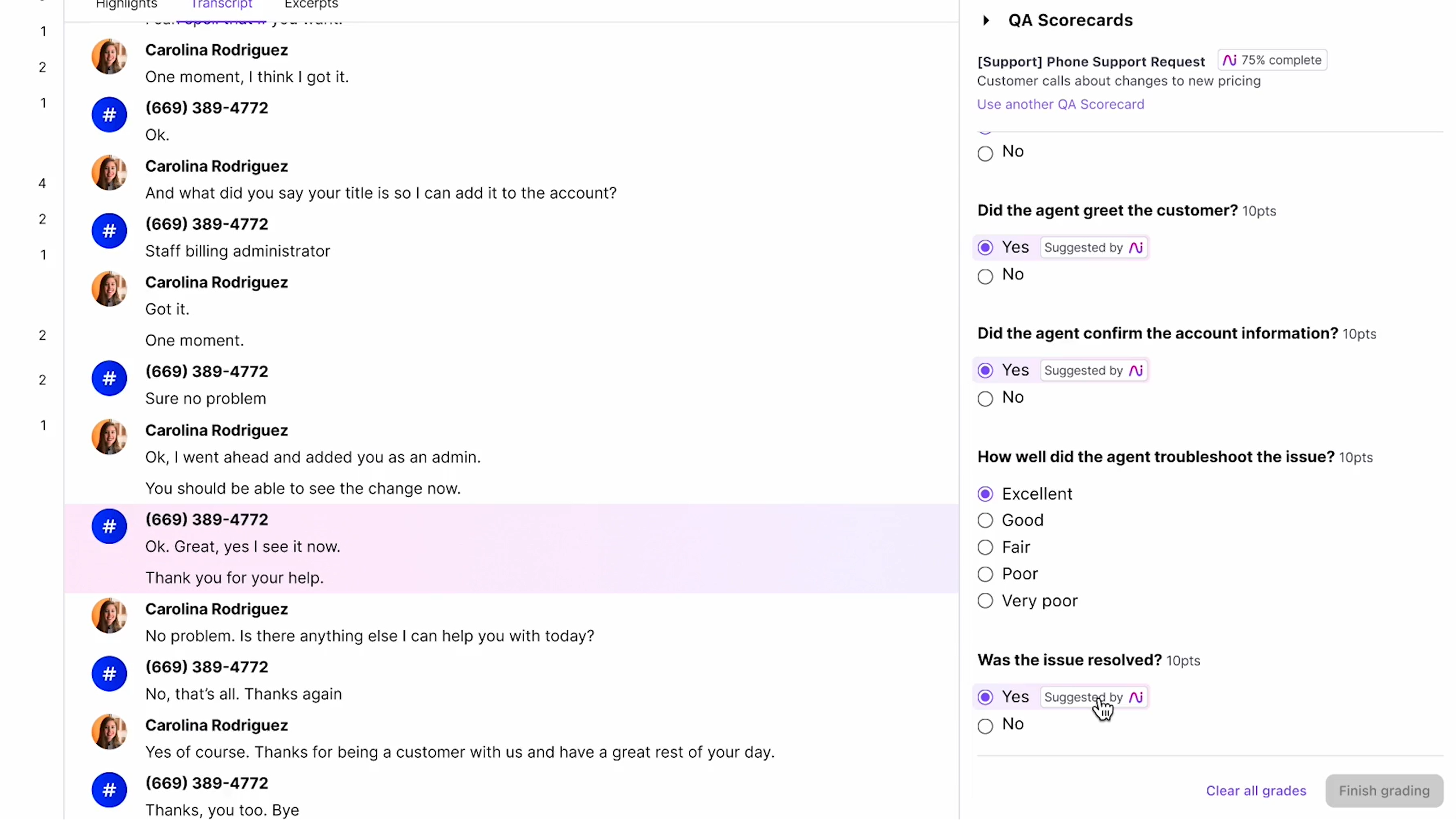
AI Features
- Custom moments: AI analyzes call transcripts to bookmark important moments–such as agreements reached, appointments made, or action items established. Agents can revisit these moments after each call.
- AI scorecards: Managers can design scorecards that use an AI algorithm to score agents automatically after each call. Combine metrics with different evaluation types, like yes-or-no boxes, checklists, and numbered scores.
- CSAT detection: Software automatically detects customer satisfaction scores based on transcripts. Agents have a live view of how the customer is feeling, and supervisors can use this information to provide agents with feedback
Pricing
Dialpad offers three contact center plans with AI features, ranging from $80 to $150 monthly per user.
- Essentials ($80 monthly): Voice and all digital channels, video conferencing, desktop app, IVR, call transcription, AI moments
- Advanced ($115 monthly): Adds real-time live agent assistance, virtual agents and chatbots
- Premium ($150 monthly): Adds AI scorecards, AI CSAT detection, AI custom moments
Best For
Dialpad AI contact center is best for contact centers that want to provide consistent feedback for agents, since the scorecards feature offers in-depth automated scoring.
Five9
Five9 offers digital-only, voice-only, and omnichannel plans with email, SMS, web chat, and social messaging. While the digital-only and voice-only plans don’t include any AI features, the omnichannel plans include rich AI-based features that empower workforce management (WFM), quality management (QM), interaction analytics, and live agent support.
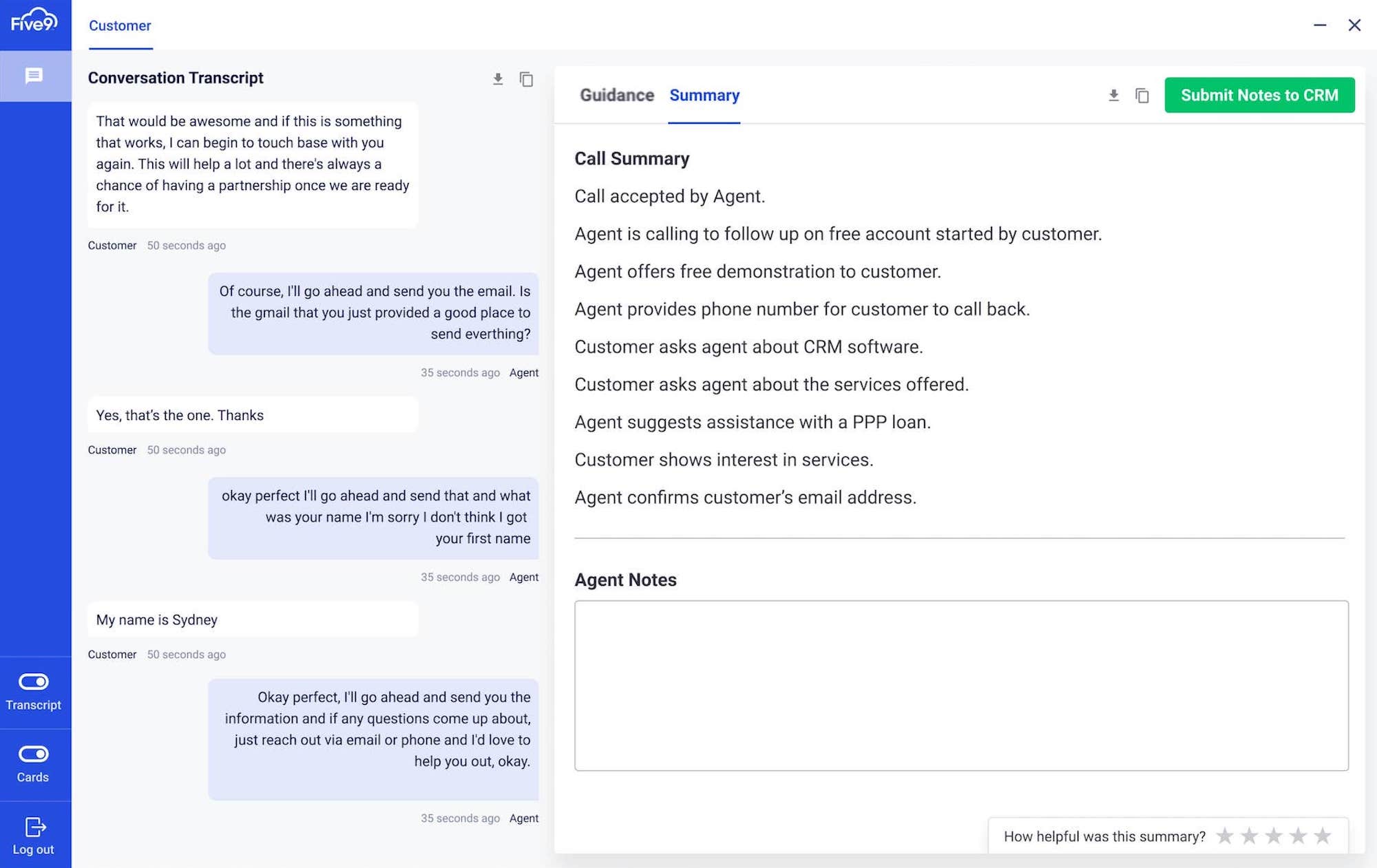
AI Features
- Interaction analytics: Five9 software scours transcripts to identify trends in customers’ attitudes toward products or particular root-cause problems. AI analyzes all speech and text interactions, with automated topic identification.
- Agent assist: Live-agent assistance uses transcripts to provide agents with on-screen guidance popups, embedded into the dashboard. The software provides checklists, reminders, relevant context, and background information about the customer.
- AI insights: Five9 analyzes all conversation topics, keywords, and sentiment scores to identify overarching trends in your customers’ experience. Identify the reason for customer calls, average handle time, CSAT score about topics and keywords, and more.
Pricing
Five9’s three highest-tier plans offer AI features, with prices ranging from $235 to $325 monthly per user.
- Premium ($235 monthly): IVR, virtual agents, (IVA), call transcription, AI call summaries and insights, outbound dialer, analytics
- Optimum ($290 monthly): Adds AI-based scheduling, live agent assistance, adherence tracking
- Ultimate ($325 monthly): Adds interaction analytics
Best For
Five9 is best for customer support teams that want to keep a close eye on customer sentiment and the issues that customers are facing.
Talkdesk
Talkdesk offers affordable digital-only, voice-only, and omnichannel contact center software, with AI-powered automations, agent assistance, and outbound engagement. Customer experience analytics provide dashboards to evaluate the quality of each interaction and support coaching. In addition to the desktop app, Talkdesk offers a mobile app for agents to message customers on all digital channels.
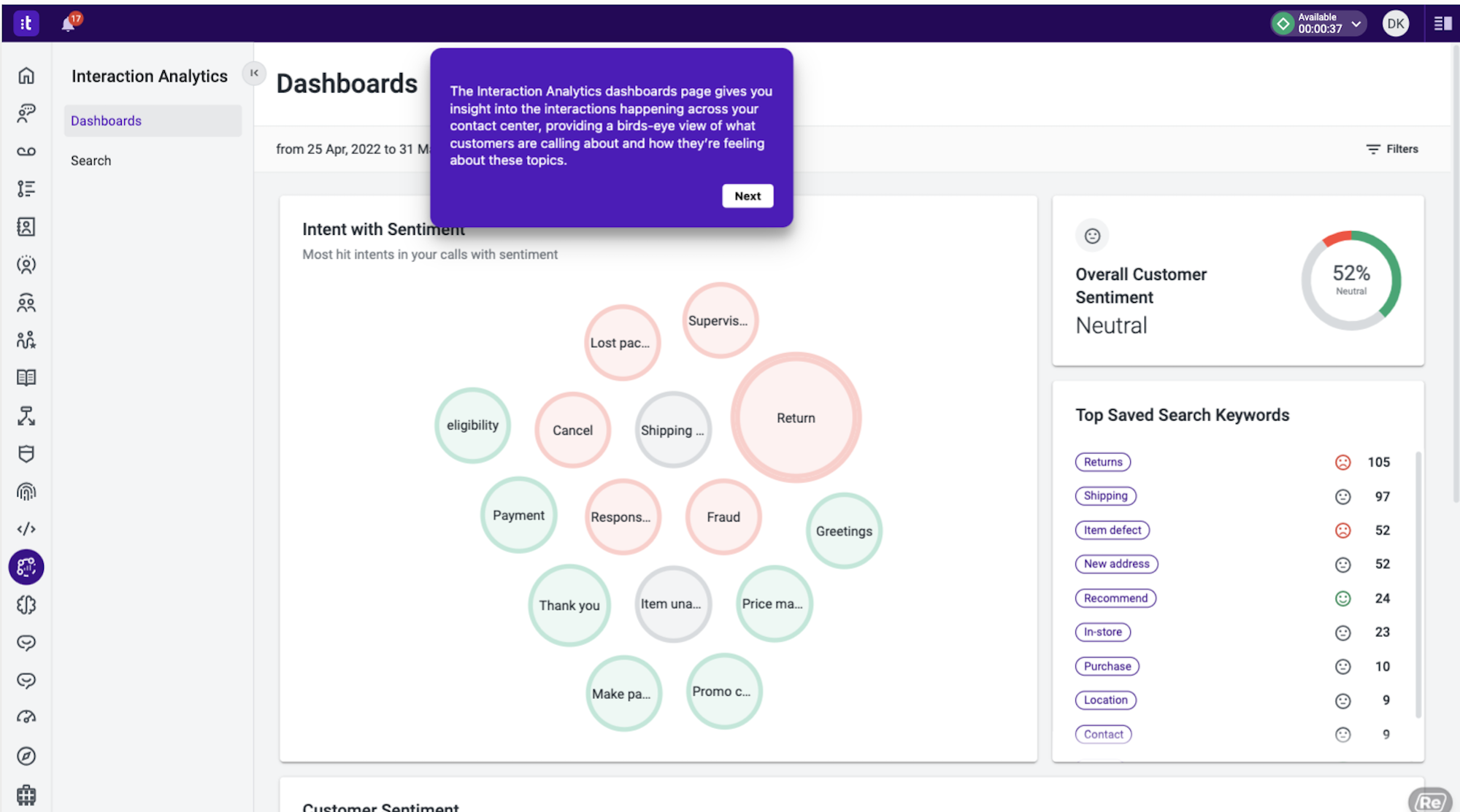
AI Features
- Automation designer: A no-code workflow designer to create scripts for surveys, virtual agents, live-agent assistance, and task-assignment workflows
- Self-service: Use a drag-and-drop interface to design the customer’s journey for virtual agents, chatbots, and IVR. Add advanced and rich actions like escalation, checking order status, appointment booking, and much more.
- AI trainer: A tool that lets you refine and tune AI self-service tools like IVAs, voicebots, and interaction summaries. Put guardrails on these AI tools, compare summaries with actual transcripts, view AI-summary accuracy scores, and examine trends in virtual agent prompt usage.
Pricing
All Talkdesk plans include AI features, with prices ranging from $85 to $145 monthly per user.
- Digital Essentials ($85 monthly): Digital-only contact center with desktop and mobile app, plus real-time analytics and virtual agents
- Essentials ($85 monthly): Voice-only call center with IVR, analytics, and an AI-based drag-and-drop automation designer
- Elevate ($115 monthly): Adds call monitoring, screen recording, and automated notifications
- Elite ($145 monthly): Performance management to track agent service quality, and your choice of one of several AI features–customer experience analytics, agent assist, and proactive outbound engagement
Best For
Talkdesk is best for contact centers seeking to provide customers with rich self-service features via webchat, with strong capabilities like bill pay, routing, and other actions.
Genesys Cloud CX
Genesys offers voice-only, digital-only and omnichannel contact center software. With low-priced plans, the CCaaS software has AI-powered features like chatbots and IVA, speech and text analytics, predictive routing, and schedule forecasting.
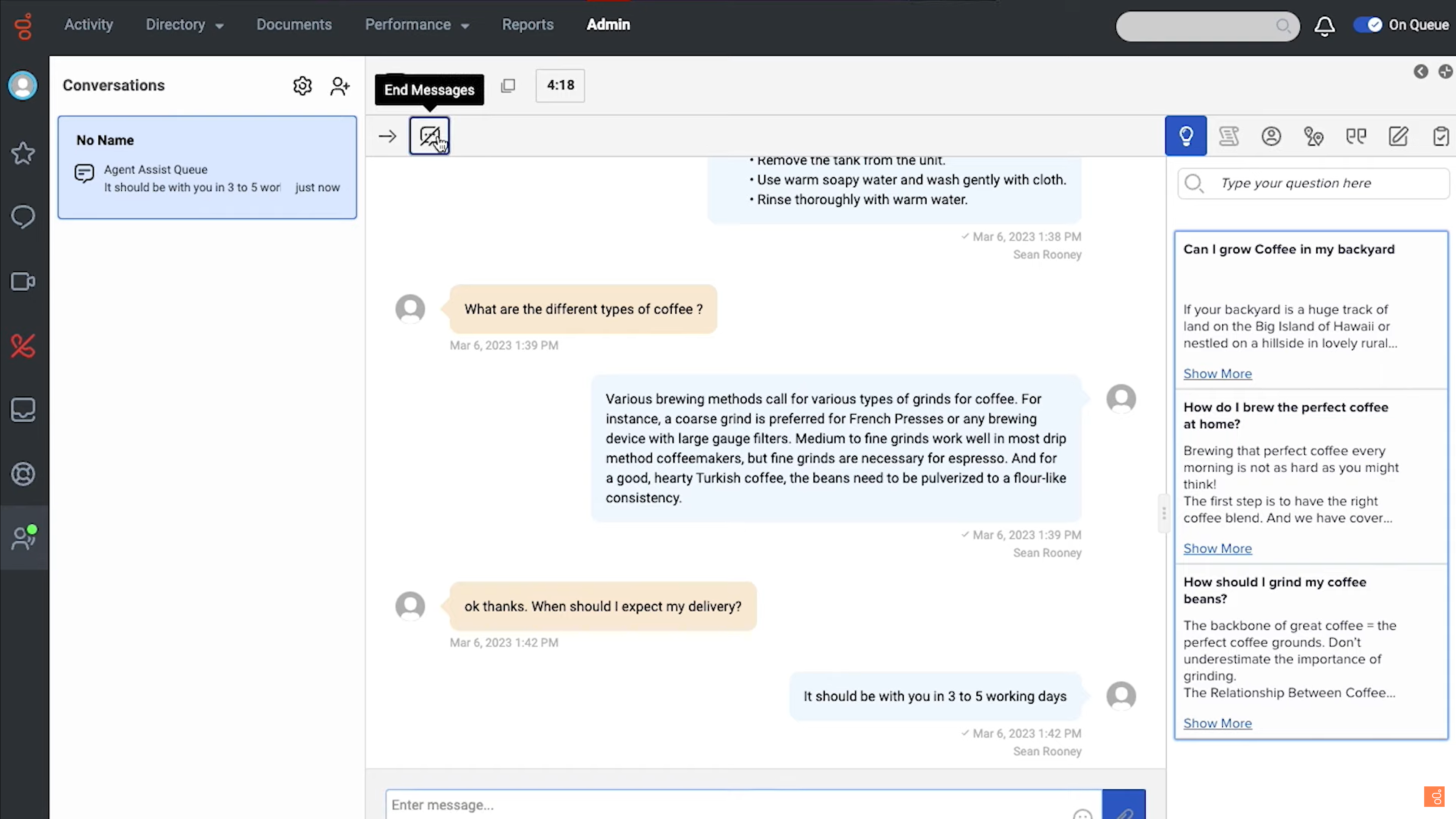
AI Features
- Predictive routing: Genesys AI evaluates queue data and agent performance to determine the most important KPI to optimize customer service in each queue. It then ranks agents by that KPI, routing customers to the optimal agent to provide the best support.
- Knowledge base: Build a knowledge base and Q-and-A bank, which powers live-agent assistance and IVA support
- Interaction evaluation: AI analyzes each transcript and interaction, taking note of key moments, topics, positive sentiment, and negative sentiment. The call records bookmark these moments in the transcript, for agent or supervisor review.
AI Pricing
Genesys Cloud CX offers five plans, each with AI features ranging from $75 to $155 monthly per user.
- Cloud 1, Voice ($75 monthly): Voice-only call center with desktop app, IVR
- Cloud 2, Digital or Omnichannel ($95-$115 monthly): Adds digital channels–email, web chat, SMS, messaging apps–plus quality management with AI interaction evaluation
- Cloud 3, Digital or Omnichannel ($135-$155 monthly): Digital-only or omnichannel options. Adds AI speech and text analytics, AI-powered forecasting and scheduling
Best For
Genesys Cloud CX is best for companies seeking AI-based customer service and analytics emphasizing digital channels.
NICE CXone
NICE CXOne is a contact center solution offering voice-only, digital-only, and omnichannel solutions. NICE CCaaS software includes 360-degree analytics for an in-depth view of agent performance. Higher-tier plans bundle AI omnichannel forecasting, voice-of-customer )VOC) analytics on IVR and workflow usage, and omnichannel analytics across all interactions.
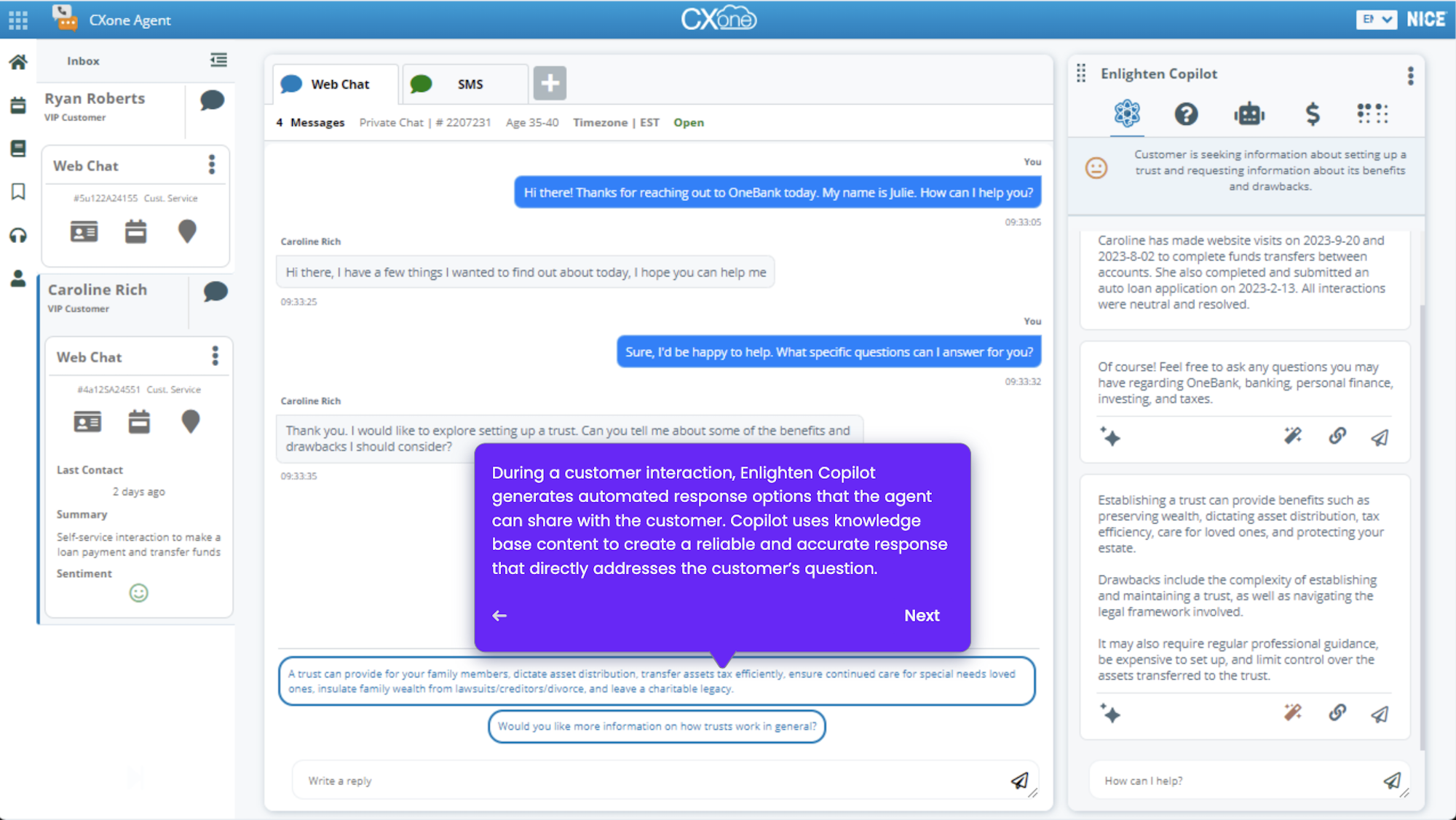
AI Features
- Enlighten Copilot: AI-driven agent support companion that provides suggested responses and knowledge, based on conversational context. Copilot also gives real-time visibility into interactions across all channels, suggesting solutions.
- Enlighten Autopilot: Intelligent self-service engine that operates across channels–like IVR, IVA, and chatbots–to learn from each interaction, providing more conversational service as time goes on
- Enlighten Actions: Interaction analytics and trends, which supervisors can view in the Enlighten Actions dashboard. Trend identification includes top reasons for customer contact, agent performance and rankings by KPI, CSAT score, transfer rate, sales success scores, and more.
AI Pricing
NICE CXone offers six contact center plans, ranging from $71 to $209 monthly per user. Only the four higher-tier plans include AI features.
- Omnichannel Agent ($110 monthly): Omnichannel routing for digital and voice touchpoints, queuing with simultaneous task handling, agent and supervisor workspace on desktop
- Essential Suite ($135 monthly): Adds quality management workflows for custom self-service across channels
- Core Suite ($169 monthly): Adds workforce management tools and agent adherence insights
- Complete Suite ($209 monthly): Adds Englishen Copilot, proactive dialer, AI-based routing, interaction analytics, and voice-of-customer feedback and trend-detection dashboards
Best For
NICE CXone is best for omnichannel customer support teams and sales centers that want to monitor customer sentiment.
The Future of AI Call Centers
Moving forward, AI will continue to play a larger role in call center operations. Here’s what to expect in the future of AI call centers:
- Continued omnichannel adoption: Convenience is a top priority for customers, especially the younger generation. Omnichannel service meets this need by providing multiple touchpoints for your customers to reach you. Omnichannel software is expected to grow with a 13.6% annual growth rate through 2030.
- Increased adoption of conversational AI: With the advent and intelligence of ChatGPT, companies have become increasingly interested in using generative AI for self-service. 68% of executives believe that the benefits of generative AI outweigh the risks, and we expect this number to increase over time.
- Reduced labor costs for businesses: As companies integrate machine learning into their contact center operations, reduced staffing needs and increased efficiency will reduce labor costs. Gartner predicts AI will reduce labor costs by $80 billion in 2026.
- Less demand for customer-support staff: Conversational AI is expected to automate many of the customer-service interactions that used to be handled by live staff. Gartner expects AI to lead to a 20-30% reduction in customer support agents by 2026.
- Phone will remain the centerpiece: While omnichannel and multichannel service will play increasingly large roles in contact center software, calling is expected to remain the primary that customers use for self-service. 86% of customers still prefer using telephony to contact customer support.
AI-based call center software makes it easier for your staff to provide excellent customer support. Omnichannel software with machine learning will support call center agents and supervisors while providing you with the metrics and KPIs to track progress toward business goals.

